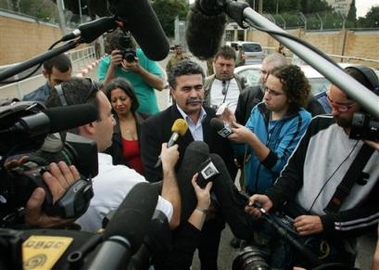|
Israel heading for elections in spring
(AP)
Updated: 2005-11-18 08:58
Israeli Prime Minister Ariel Sharon and his main political rivals agreed
Thursday to hold elections early next year, a decision likely to freeze any
plans to capitalize on Israel's Gaza withdrawal to restart Mideast peace talks.
Sharon, who remains Israel's most popular politician, had resisted moving up
the election scheduled for next November but changed his mind after the Labor
Party threatened to bolt the coalition, putting the survival of his government
in doubt.
A series of urgent election-related meetings on Thursday overshadowed a
fresh, hard-won agreement reached two days earlier on reopening the vital
Gaza-Egypt crossing, illustrating that until a new government is in place,
Israeli leaders will be concentrating on domestic politics instead of
peacemaking.
Palestinians, too, are heading into an election season, with parliamentary
balloting set for Jan. 25, featuring candidates from the Islamic militant group
Hamas for the first time, mounting a serious challenge to Palestinian leader
Mahmoud Abbas.
There had been hopes that the pullout from the Gaza Strip would jump-start
efforts toward a full peace accord between Israel and the Palestinians, but the
intervening weeks were dominated by haggling over the border crossing — an issue
finally resolved with the direct intervention of Secretary of State Condoleezza
Rice.

Israel's newly elected Labor Party leader Amir
Peretz speaks to the media after a meeting with Israeli Prime Minister
Ariel Sharon in Tel Aviv, Israel, Thursday Nov. 17, 2005.
[AP] | The surprise selection last week of fiery union leader Amir Peretz as Labor
Party leader and candidate for prime minister also threw the Israeli political
world into turmoil. Peretz campaigned on a promise to force new elections.
Peretz and Sharon met Thursday and agreed to move up the election. Peretz
said Sharon would call the poll for late February or sometime in March, meaning
a relatively short campaign in Israeli terms. Formation of a new government
could take up to two months after that.
Joseph Lapid, head of the opposition Shinui Party, met with Sharon later
Thursday and said they agreed on a March ballot.
"On the one hand, we want to shorten the process, but on the other, we have
to give time to prepare for elections, and so we agreed they would be in March,"
Lapid told The Associated Press.
Sharon's spokesman Asaf Shariv said only that the prime minister wanted to
hold elections as soon as possible. The prime minister plans to consult with
other political parties on possible election dates before a scheduled parliament
vote on Monday on dissolving the government, Shariv said.
Soon after the agreement to hold early elections was reached, Israeli forces
killed two Palestinian militants outside the West Bank town of Jenin.
Palestinian officials condemned the attack and said they feared the violence
would intensify in the run-up to the vote.
"I hope that the Israeli election campaign will not be marked by more
Palestinian blood," Palestinian negotiator Saeb Erekat said.
The source of the turmoil dates to Sharon's surprise announcement almost two
years ago that he would withdraw from Gaza and part of the West Bank, reversing
his decades of action to build new settlements and expand existing ones.
The pullout, completed in September, splintered his Likud Party and forced
him to reshuffle his Cabinet, bringing in Labor, a dovish mainstream party that
traditionally has favored withdrawal from much of the West Bank and Gaza and was
Likud's main rival.
Peretz wants to renew the rivalry on economic and social issues, as one of
the few leading Israeli politicians who maintains that domestic poverty and
social inequality are more important matters than Israel-Palestinian
peacemaking.
Despite the tight timetable, Israel's political parties might realign before
the election. Shariv said Sharon has not decided whether to remain in Likud or,
instead, to create a new centrist party that reflects his changed outlook.
That would leave Likud, which Sharon himself stitched together from several
hard-line parties in the 1970s, as a bastion of opponents to making further
concessions to the Palestinians.
|